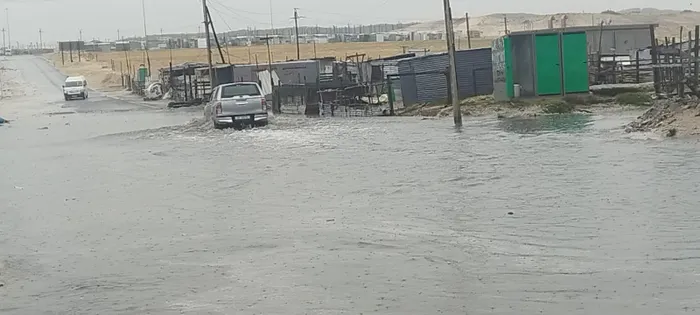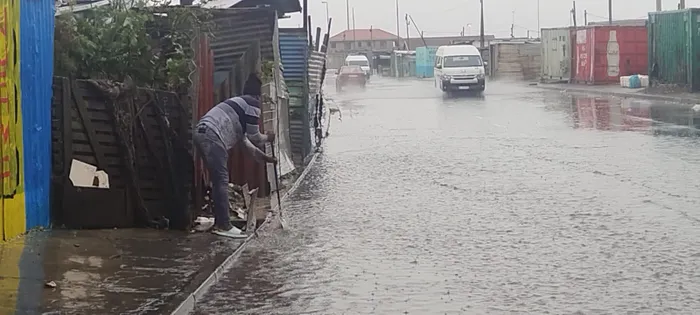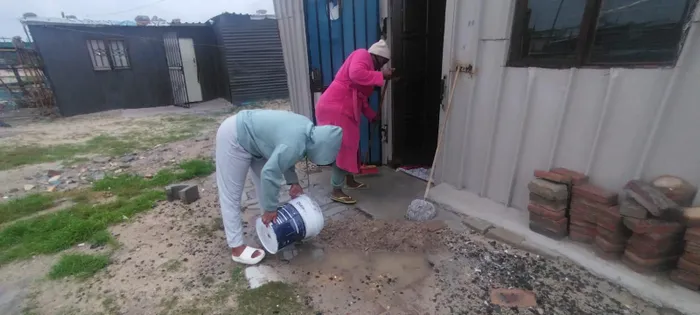Heavy downpours wreak havoc in informal settlements

Vehicles stayed away from some roads in Khayelitsha because of the floods.
Image: Phiri Cawe

Enkanini resident Sandisile had his hands full stopping water from entering his shack. He said he was tired of complaining about services and proper houses. He will rather look after his health than complaining.
Image: Phiri Cawe

A mother and daughter in Empilweni informal settlement along Mew Way Road trying to prevent water from entering their shack. The daughter could not go to school because of the heavy winter rains.
Image: Phiri Cawe
PHIRI CAWE
Residents of informal settlements in Khayelitsha say living in shacks is intolerable and they desperately need decent housing.
The heavy downpour on Tuesday left those living in Empilweni, Seaside, Nkanini and eNdlovini struggling to keep their homes dry.
Vukani saw many trying to repair their roofs and sweep water away from their front doors.
Several motorists found themselves trapped as their vehicles got stuck in flooded roads.
Nobuntu Ngentu and her daughter Sisipho from Empilweni informal settlement attempted to curb the water with sand. Sisipho stayed home from school to help her mother.
Nobuntu said she has been staying in the area for the past four years.
“We have no electricity, no roads and not a lot of infrastructure here. There is no ablution facility. We have been crying for help but nothing has come our way. Now that it is winter, the rain will destroy some of the structures here, especially those in low-lying areas.”
She said winter is going to be a terrible time for them.
“We have to use paraffin and that is dangerous. That is why you find out that shacks are always on fire because we have to use paraffin and candles. We are people too and we deserve a better life like those in houses,” she said.
Along Mew Way, a resident who only wanted to be known as Sandisile, was sweeping water away from his shack.
The eNkanini resident said he was tired of complaining about the rain and resources every year. He said it was clear that no one cares about them. “We have done all we can to get proper houses and electricity but nothing has come our way. At some point we closed roads, burned tyres but zilch services. The only thing now is to look after my shack and health. As you can see, my house has flooded and the streets are covered with water. I have a duty to clean this mess, nothing else. I am really tired of complaining and nothing being done.”
Charlotte Powell, spokesperson for Disaster Risk Management, said the department’s staff do public awareness sessions throughout the year and in all areas, to inform residents about risk reduction measures and tips on how to keep their homes from flooding.
“The City of Cape Town has a multi-departmental Winter Task Team that oversees risk mitigation measures in the lead-up to winter, and required responses during the season. The task team is coordinated by the City’s Disaster Risk Management Centre. The task team comprises more than 25 city departments and external partners including the SAPS, the NSRI, provincial government, and the SPCA. Bi-weekly meetings start in February each year, to keep track of the implementation of risk mitigation measures.
"Risk reduction measures include identifying at-risk informal settlements that are flood-prone due to location or topography, and moving residents to higher ground where possible or implementing flood-mitigation measures, cleaning and maintenance of critical stormwater infrastructure in high flood-risk areas and removing invasive aquatic and terrestrial plants along key river corridors, proactive pruning/maintenance of trees to minimise the risk of falling branches and debris, ongoing education and awareness programmes around floods and fires, including practical tips on how to raise floor levels and divert flood waters, and service level agreement with the South African Social Service Agency to provide humanitarian aid to residents in distress and discomfort as a result of flooding and storm damage,” she said.
Ms Powell said as much as the city is duty-bound to ensure that it has done everything possible to mitigate risks to public health and safety, residents also need to do their part. She said her department advises residents to consider digging trenches to direct water away from their homes if need be. They also need to build their dwelling higher than the average water level in their areas, clear out drainage systems and raise the floor level of a structure so that it is higher than the natural ground level.
She also called on residents to report blocked drains, intakes and illegal dumping in the storm water canals and sewers that make flooding worse.
She said winter is also the time when there is an increased risk of structural fires so residents need to ensure that cooking fires are extinguished properly, keep a bucket of sand and a bucket of water handy, teach children not to play with matches and lighters,
store matches and lighters out of children’s reach, put out all candles and lamps before going to sleep or leaving home and be aware of their load-shedding schedule. Ensure appliances are switched off, especially at night, so when power is restored there is no risk of a power surge.
In the event of flooding, storm or fire-related emergencies, residents should phone the City's Public Emergency Call Centre on 021 480 7700 from a cell phone or 107 from a landline